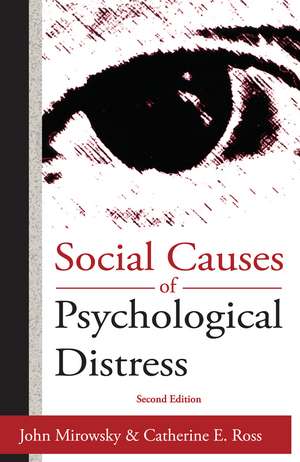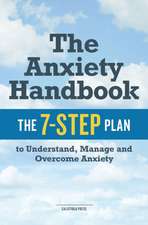Social Causes of Psychological Distress: Social Institutions and Social Change Series
Autor Catherine E. Rossen Limba Engleză Paperback – 31 mar 2003
Din seria Social Institutions and Social Change Series
- 14%
 Preț: 298.10 lei
Preț: 298.10 lei - 23%
 Preț: 328.39 lei
Preț: 328.39 lei - 24%
 Preț: 324.16 lei
Preț: 324.16 lei - 26%
 Preț: 764.20 lei
Preț: 764.20 lei -
 Preț: 422.91 lei
Preț: 422.91 lei -
 Preț: 396.95 lei
Preț: 396.95 lei - 15%
 Preț: 436.99 lei
Preț: 436.99 lei -
 Preț: 431.84 lei
Preț: 431.84 lei -
 Preț: 413.33 lei
Preț: 413.33 lei -
 Preț: 410.76 lei
Preț: 410.76 lei -
 Preț: 406.74 lei
Preț: 406.74 lei - 13%
 Preț: 295.25 lei
Preț: 295.25 lei - 16%
 Preț: 103.71 lei
Preț: 103.71 lei - 12%
 Preț: 302.84 lei
Preț: 302.84 lei -
 Preț: 447.58 lei
Preț: 447.58 lei - 13%
 Preț: 292.41 lei
Preț: 292.41 lei
Preț: 444.70 lei
Nou
Puncte Express: 667
Preț estimativ în valută:
85.09€ • 89.32$ • 70.63£
85.09€ • 89.32$ • 70.63£
Carte tipărită la comandă
Livrare economică 10-24 aprilie
Preluare comenzi: 021 569.72.76
Specificații
ISBN-13: 9780202307091
ISBN-10: 0202307093
Pagini: 328
Dimensiuni: 152 x 229 x 22 mm
Greutate: 0.45 kg
Ediția:New.
Editura: Taylor & Francis
Colecția Routledge
Seria Social Institutions and Social Change Series
Locul publicării:Oxford, United Kingdom
ISBN-10: 0202307093
Pagini: 328
Dimensiuni: 152 x 229 x 22 mm
Greutate: 0.45 kg
Ediția:New.
Editura: Taylor & Francis
Colecția Routledge
Seria Social Institutions and Social Change Series
Locul publicării:Oxford, United Kingdom
Cuprins
I: Introduction; 1: Introduction; II: Researching the Causes of Distress; 2: Measuring Psychological Well-Being and Distress; 3: Real-World Causes of Real-World Misery; III: Social Patterns of Distress; 4: Basic Patterns; 5: New Patterns; IV: Explaining the Patterns; 6: Life Change: An Abandoned Explanation; 7: Alienation; 8: Authoritarianism and Inequity; V: Conclusion; 9: Why Some People Are More Distressed Than Others; APPENDIX: Description of Data Sets and Measures
Descriere
A core interest of social science is the study of stratification--inequalities in income, power, and prestige












